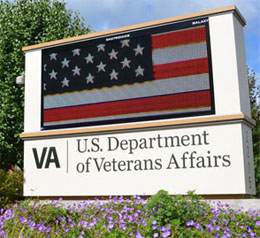NATIONAL
Filling 49,000 vacancies at VA isn’t a priority for White House
The following is from the American Federation of Government Employees (AFGE):
 WASHINGTON, D.C. (March 6, 2019) — The American Federation of Government Employees fought a long battle for transparency around vacancies at the U.S. Department of Veterans Affairs, finally forcing the agency to regularly publish information about the number of unfilled positions throughout the VA. The latest batch of numbers shows what we’ve known all along: there are 49,000 vacancies at the VA.
WASHINGTON, D.C. (March 6, 2019) — The American Federation of Government Employees fought a long battle for transparency around vacancies at the U.S. Department of Veterans Affairs, finally forcing the agency to regularly publish information about the number of unfilled positions throughout the VA. The latest batch of numbers shows what we’ve known all along: there are 49,000 vacancies at the VA.
Unfortunately, Veterans Affairs Secretary Robert Wilkie told lawmakers in his most recent appearances at two congressional hearings something else that we already knew: filling the nearly 49,000 vacancies at VA hospitals and other VA facilities isn’t a focus of this administration.
At the House Veterans Affairs Committee’s hearing about the future of the VA on Feb. 27, Rep. Conor Lamb (D-Penn.) questioned Wilkie about the nearly 49,000 vacancies at the VA, including 43,000 at the Veterans Health Administration.
Lamb said nurses and other health care professionals have major concerns about the effect of staffing shortages on their ability to provide our veterans with the care they deserve, as well as the health and well-being of the VA staff working longer hours to make up for the severe staffing shortages.
He went on to ask whether Wilkie was concerned about the vacancies and what steps he has taken to try to fill these positions.
“I will be honest with you,” Wilkie replied. “Yes, I am concerned. I would not be honest with you if I told you that my focus would be filling 49,000 vacancies.”
The VA secretary said the same thing at a different hearing the day before.
If the VA were concerned about its own mission of providing health care to veterans, then addressing the colossal number of vacancies throughout the system would be a priority. Instead, the VA shamefully has abandoned their mission, instead following the Trump administration’s push to privatize and dismantle the VA’s healthcare system.
“I am shocked that Secretary Willkie testified before two House committees this week about his steadfast refusal to fill the nearly 49,000 vacancies in the VA,” said AFGE President J. David Cox Sr.
Real reasons why the VA can’t recruit medical professionals
 The VA has plenty of tools to compete for scarce medical professionals, but the department has refused to offer competitive pay or address crushing workloads.
The VA has plenty of tools to compete for scarce medical professionals, but the department has refused to offer competitive pay or address crushing workloads.
The department has had a difficulty recruiting employees also because this administration and their allies in Congress have repeatedly attacked employees’ workplace rights and voice at work. Last year the VA attacked Title 38 employees – nurses, doctors, and other medical staff – by removing their ‘official time’ – the hours they use to make sure employees have the resources and training to do their work and to combat workplace discrimination and retaliation.
This action took away the statutory right of 100,000 VA health care workers to representation in the workplace. Our union quickly filed a lawsuit along with National Federation of Federal Employees and the National Association of Government Employees.
Veterans’ education is not Wilkie’s priority either.
Asked by Congressman Mike Levin (D-Calif.) about the need for better IT and more staff following the GI Bill debacle last year, in which thousands of veterans did not receive their full education benefits because of chronic IT issues, staffing and budget shortfalls, Wilkie replied by saying that he just started on the job when this happened and that the new contract went out last week.
“I don’t envision any new staff having to be hired because of the IT system, which is being run by a very important, big company [that] will obviate the need for additional staff,” he said.
Filling 49,000 vacancies must be the VA’s priority
Call and visit your members of Congress and write a letter to the editor to explain why filling these 49,000 vacancies must be the VA’s priority. If you are a VA or federal employee and haven’t joined AFGE, join us now. We need to make sure our VA hospitals and facilities are fully staffed and funded so we can serve our veterans better. Our veterans deserve nothing less than a full, concerted effort to staff their hospitals, which are indeed their community.





